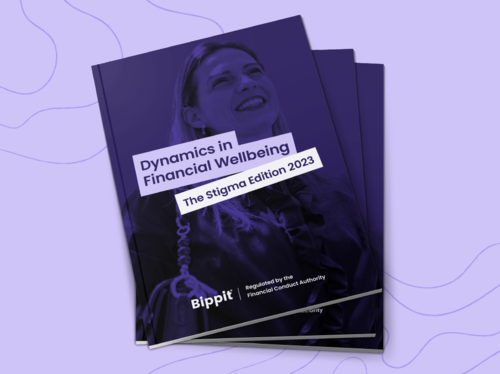Financial support at work critical to tackling money stigma
Employees who receive financial support at work are almost four times as likely to want to share money concerns with their organisation, according to new research.
Dynamics in Financial Wellbeing, based on a survey of 5,000 UK workers, shows that just 16% of employees that report getting no employer financial support would share money worries at work. This rises to a significant 62% for those who say they do receive support.
Talking about money can reduce stress and anxiety, as well as increase knowledge and experience, which helps us make better decisions and develop a better relationship with money.
The new research report, created by financial wellbeing platform Bippit, also highlights a significant perception problem: organisations and employees don’t agree over whether financial support is even being offered.
Almost a third (29%) of employees said they didn’t receive any financial wellbeing support from their employer, yet all 660 senior HR professionals polled said their organisation provided support.
Six in seven (84%) HR professionals said they provided a workplace that encouraged employees to share money worries, but just half (52%) of employees agreed.
The same number of HR professionals (84%) also said they’d asked staff about money in the last three years, but well over half of employees (59%) said this was not the case.
Organisations have some real work to do on making employees comfortable talking about money, with only around half of employees currently feeling comfortable talking about money issues (48%) or mental health issues (52%) with their employer.
Younger and older workers were also less likely to confide in their employer (70% of 18-25s and 74% of over 55s would stay silent, compared to 58% across all ages). Women were also massively less likely to tell their employer about their money worries, with 50% keeping quiet compared to 21% for men.
Employers must get dialed into the cost-of-living crisis and use personal finance stories as an opportunity to open dialogue with staff. They also need to stop trying to engage with all employee cohorts in the same way and start personalising communication to capture attention.
Sam Lathey, Chief Executive of Bippit, said:
“Encouraging open money conversations is a critical business initiative so that employees can be signposted to the right financial wellbeing support at the right time. Without this, our organisations are left with an elephant in the room when it comes to financial stress. It’s important that employers consider not only what they offer in terms of financial care, but also how their engagement comms impact the perception of this support, because it’s clear that trust and willingness to talk are influenced by how much employees believe their organisation is doing in terms of financial wellbeing.”
Michael Royce, Senior Policy Manager at the Money and Pensions Service, said:
“Talking about money helps people make better financial decisions, have stronger relationships and share the burden that problems can cause. It’s clear that some people are looking to do this at work, so it’s important to understand how and why they might need their employer’s support. “This report is a welcome addition to our understanding and it offers some important insights into what people are struggling with and how we can help. We look forward to working with Bippit and other stakeholders during our annual Talk Money Week as we seek to improve financial wellbeing in the workplace.”
Andrew Berrie, Head of Workplace Wellbeing at mental health charity Mind, said:
“Bippit’s research shows that whilst stigma around financial concerns is easing, disclosure for support remains low and this means that many employees will be experiencing stress and anxiety as a result. Having a sense of control of your personal finances is a key step in addressing feelings of worry or anxiety. Educational programmes around budgeting, pensions and planning for retirement can be a great source of support.”
Ben Harrison, Director of the Work Foundation at Lancaster University, said:
“Work Foundation research has found that stigma relating to financial wellbeing can often prevent employees from seeking wider information or support from their employer. Overcoming this will require employers to lead a culture change within their organisations, encouraging open conversations about financial wellbeing, proactively highlighting available information regarding financial support, debt management and welfare benefits and offering peer to peer and anonymised forms of engagement.”
You can download a copy of the full report here:
Dynamics in Financial Wellbeing
For further information please contact Fraser Butters on fraser@pervasivepr.com or 07766 566396
This press release was distributed by ResponseSource Press Release Wire on behalf of Pervasive PR in the following categories: Personal Finance, Business & Finance, Education & Human Resources, for more information visit https://pressreleasewire.responsesource.com/about.
